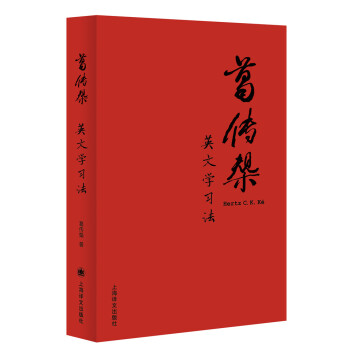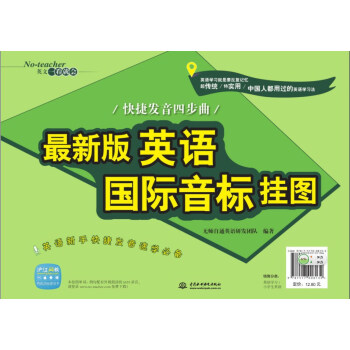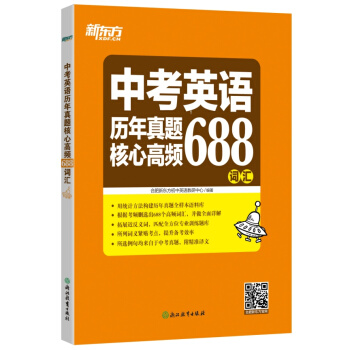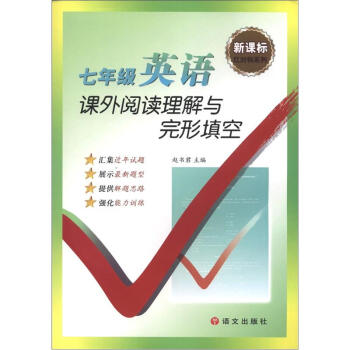

具体描述
编辑推荐
适读人群 :广大英语学习者《葛传椝英文学习法》收录了葛传椝先生用英语撰写的有关英语学习的短文75篇,围绕英语学习的方方面面,提出了作者自己的心得和方法。葛先生自学英语成才,是英语自学者的标杆,他的学习方法值得英语学习者们效仿借鉴。
内容简介
《葛传椝英文学习法》收录了葛传椝先生的用英语撰写的有关英语学习的短文75篇,围绕英语学习的方方面面,提出了作者自己的心得和方法。每一篇文章都可以独立阅读,文后辅以注释,便于理解和学习,深入浅出,中学生即能读懂。作者简介
葛传椝(1906-1992),复旦大学教授,上世纪50年代复旦大学英语语言文学系“三巨头”之一。幼时家境清贫,初中辍学后,自学英语。1921年考入上海电报传习所,翌年至崇明县立中学任教。1925年起任上海商务印书馆英语编辑,直至八一三中日淞沪战争爆发。任职其间发现很多英语单词的中文词意义相同,而英语的习惯表述却差异很大,即以6年时间编写《英语习惯用法词典》,于1942年出版,是为中国人编写的第一部英语惯用法词典。在查阅《简明牛津词典》(The Concise Oxford Dictionary of Current English)时,发现其中不少错误,即致信词典主编英人福勒(H. W. Fowler),为福勒所钦佩。之后,为中华书局、竞文书局编写英语读本。1945年起任教于上海光华大学。中华人民共和国成立后,接上级教育主管单位命令,1951年光华大学与大夏大学合并成立华东师范大学,继续在此执教至1954年,继而调往复旦大学外文系任教,直至1986年退休。1992年7月在上海逝世。著有久负盛名的《英汉四用词典》、《新英汉词典》(主要编纂者之一),以及《英语惯用法词典》、《英语写作》,被学界誉为一代宗师,为中国英语教育界先驱之一。内页插图
目录
What is Your Object in Studying English? ... 1A Few Warning Words ... 3
Two Dictionaries Recommended ... 6
How to Read the Dictionary ... 9
Good Pronunciation ... 12
English Pronunciation is English ... 15
What to Read ... 18
Reading Aloud ... 21
Do You Read the Preface? ... 25
Can You Read Englishmen’s English? ... 28
Verse and Poetry Distinguished ... 30
A Few Terms of Prosody Explained ... 33
About Composition “Don’ts” ... 36
An Easy Sentence to Study ... 38
Idiom and Slang ... 41
Logic and Usage ... 44
A Special Use of Quotation-Marks ... 47
Double Negatives in Current English ... 49
What Does “Would of Come” Mean? ... 51
“No! No! NO!” ... 53
Language and Impression ... 56
Lying without Deceiving ... 59
Puns and Punning ... 62
What is Humour? ... 65
Irish Bulls ... 68
Repartees ... 71
Do You See the Point of the Joke? ... 74
Can You Guess a Riddle? ... 76
The Familiar Essay ... 79
Headings in Newspapers ... 82
Headings and Sub-headings ... 85
The Beginning is a Summary ... 88
Some Common Expressions in News Items ... 91
Letters from Correspondents ... 95
Letters to the Editor ... 98
Leaders and Leaderettes ... 101
The Book Page ... 104
The Woman’s Page ... 107
Dramas, Movies, Etc. ...111
Advertisements ...115
Wanted — A Guide to Idiomatic English for Chinese Students ...119
Reading to Learn the Art of Expression ... 122
About the Study of Grammar ... 125
Knowing Just Enough Grammar to Go Wrong ... 128
A “Foolish” Principle of Composition ... 130
An Aid to Composition ... 133
Some Mistakes to Consider ... 135
Some More Mistakes to Consider ... 137
Make the Word Your Own ... 140
Words that Are Too Often Used ... 142
Metaphorical and Plain Idioms ... 144
Are You a Votary of Mrs Malaprop? ... 147
A Warning Regarding the Use of Words ... 150
What “Literary English” Means ... 152
Simplicity and Affected Simplicity ... 154
Love of Commercialisms ... 157
The Compound-Prepositional Style ... 160
Imitation, Good and Bad ... 163
Paraphrase as an Exercise in Composition ... 166
Composition and Compositions ... 169
On English Letter-Writing ... 172
A Few Points of Form in Letters ... 175
Never Mind the Shortness ... 178
Three Popular Superstitions ... 181
The That-Clause in Letters ... 183
Notes on Some Common Words in Letters ... 186
Two Friendly Letters ... 189
On the Europeanization of the Chinese Language ... 192
Some Fragments of Pai Chü-I’s Poetry Concerning Women ... 199
Some Longer English Lyrics ... 206
How to Study English ... 230
前言/序言
用户评价
收到您的要求。我将以一个读者的身份,从不同的角度和风格来评价一本名为《葛传椝英文学习法》的书籍,但评价内容将不会提及该书的具体内容,而是围绕阅读体验、方法论的普遍性、作者的写作风格、对学习态度的影响以及书籍的整体设计等方面展开,并确保每段评价的语言风格、结构和侧重点都有显著差异。 --- 这本书的装帧设计简直是一场视觉盛宴,拿在手里就能感受到一种沉稳而又不失活力的气息。封面那种低调的色彩搭配,加上字体排版的考究,让人一看就知道这不是那种浮夸的畅销书,而是真正用心打磨过的作品。我特别喜欢它内页的纸张选择,那种略带米色的质感,让长时间阅读眼睛也不会感到疲劳,这对于我们这些习惯于长时间对着屏幕的现代读者来说,简直是一种莫大的福音。更别提它的开本设计了,恰到好处地平衡了携带的便利性和阅读的舒适度,无论是通勤路上还是窝在沙发里,都能找到一个舒服的姿势去“啃”它。坦白说,很多时候我们买书,很大一部分动力来源于它是否“悦目”,这本书在这方面做得无可挑剔,它成功地营造了一种让人愿意亲近、愿意投入的阅读氛围。当我把书放在书架上时,它本身就成了一道风景线,那种艺术感和实用性的完美结合,已经为接下来的阅读体验打下了坚实的基础,让人充满了对知识的期待和尊重。
评分从一个普通学习者的角度来看,这本书最令人称赞的一点是它的“可操作性边界”。它并没有试图将所有人都塑造成同一种模子里的学习机器,而是非常巧妙地提供了一个坚实的框架,同时留出了巨大的个人发挥空间。很多学习指南的弊端就在于过于僵硬,一旦你的个人情况与书中的模板稍有偏差,整个体系就会崩塌。然而,这本书提供的似乎是一种“心法”而非“招式”,它教会你如何观察自己的学习偏好、如何识别自己的弱点,并根据这些独一无二的变量去调整大方向。这种鼓励个性化微调的设计理念,极大地降低了入门的心理门槛,让那些自认为“笨拙”或者“没有天赋”的人也能找到属于自己的节奏,真正做到了因材施教,或者说,是“授人以渔”的同时,还教会了他们如何自己“织网”。
评分说实话,我对市面上那些号称“速成”或“秘籍”的书籍一向抱持着高度的怀疑态度,而这本书给我的感觉完全不同。它似乎更像是一位经验丰富的老前辈,不是直接递给你一碗“鸡汤”,而是耐心地跟你一起梳理学习路上的那些“弯路”和“死胡同”。阅读过程中,我时常会停下来,不是因为我没理解,而是因为作者的某些观点触动了我对“学习”本质的重新思考。这种引发深层反思的写作方式,远比那些堆砌理论或简单罗列技巧的书籍来得更有价值。它没有急于告诉我“该做什么”,而是引导我去探究“为什么我要这样做”,这种由内而外的驱动力,才是真正的学习动力源泉。这种扎根于方法论哲学层面的探讨,使得这本书的价值超越了单一的语言学习范畴,它更像是一本关于如何高效地建立并优化个人认知系统的指南,非常耐人寻味。
评分这本书在排版和章节划分上的匠心独运,是很多专业书籍望尘莫及的。它似乎深知读者的耐心是有限的,所以即便是探讨深奥的原理,也会被巧妙地拆解成若干个容易消化的小模块,每一个模块的收尾都带着一个清晰的“下一步思考”提示。这种结构设计,极大地提升了阅读的效率和知识的留存率。我发现自己不需要频繁地回头翻阅,因为作者在构建知识体系时,已经为我们铺设好了清晰的逻辑路径和记忆锚点。这种对读者体验的极致关注,使得这本书摆脱了“理论说教”的刻板印象,更像是一份精心策划的知识探险地图。每一次翻页,都像是在解锁一个新的关卡,充满了期待和成就感,让人愿意一气呵成地读完,并在合上书本后,还能感受到知识点在脑海中仍然清晰地排列着。
评分作者的叙事节奏把握得极其精准,简直像是在指挥一场交响乐。时而激昂澎湃,通过一些生动的案例或场景描绘,瞬间将读者的情绪拉升到最高点,让人热血沸腾,恨不得立刻起身实践;时而又戛然而止,转为一种近乎禅宗般的沉静与内省,用极其精炼的语言点破那些看似复杂实则简单的核心规律。这种抑扬顿挫的文本结构,极大地增强了阅读的粘性,让你完全沉浸其中,忘记了时间的流逝。我很少能遇到一本书,能让我在同一时间体验到“被鞭策”和“被治愈”的矛盾感受。这种高超的文字驾驭能力,体现了作者深厚的文化积淀和对读者心理的深刻洞察,使得阅读过程本身成了一种享受,而非负担,即便是面对一些需要集中精神理解的部分,也不会感到枯燥乏味。
评分经典。。。。。。。。。
评分这个书非常好。很有名气。
评分书非常整洁,开本也比较小而薄,感觉却很精华。买给自己和男朋友,希望我们都能顺利一道出国
评分每次都懒得评价 后来总是看到评价给京豆 就多说几句 自从京东 很少什么宝 京东的快递人员素质很高 大件主动送上门 再也不用求爷爷告奶奶的请快递人员麻烦给我送一下 说好多好听的 单身女孩 快递员都惹不起 搬不动 不给送 哭过好多次 还有京东经常有活动 满减 买了plus 还有会员价 每月送卷送京豆 嗯 就这样吧 东西都很好
评分不错,物流非常好
评分非常好,很值得,用法很经典
评分很不错的书,慢慢看。
评分不错,京东的物流的速度倒挺快,书也很好
评分此用户未填写评价内容
相关图书
本站所有内容均为互联网搜索引擎提供的公开搜索信息,本站不存储任何数据与内容,任何内容与数据均与本站无关,如有需要请联系相关搜索引擎包括但不限于百度,google,bing,sogou 等,本站所有链接都为正版商品购买链接。
© 2026 windowsfront.com All Rights Reserved. 静流书站 版权所有





![许渊冲英译中国经典诗文集-宋词三百首(精装)(汉英) [300 Song lyrics] pdf epub mobi 电子书 下载](https://pic.windowsfront.com/10913089/5996a4dfNa35b6546.jpg)
![小学英语读写新视野3(附CD光盘1张) [TLME to Read and write] pdf epub mobi 电子书 下载](https://pic.windowsfront.com/10971445/c1d55a8e-cc19-4b3a-99ec-ebdb9744a344.jpg)


![小学英语阅读阶梯训练101篇(五年级) [Stage Training:101 English Reading for Pupils] pdf epub mobi 电子书 下载](https://pic.windowsfront.com/11717482/559487c5Nc728692f.jpg)



![6500词床头灯英语学习读本:不可不知的欧洲历史故事10(英汉对照) [Historical Stories of Europe] pdf epub mobi 电子书 下载](https://pic.windowsfront.com/10051507/9561784c-a953-4887-b5a5-ea49c544e60b.jpg)
![世界名著典藏系列:福尔摩斯经典系列全集(英文全本) [The Complete Classic Series of Sherlock Holmes] pdf epub mobi 电子书 下载](https://pic.windowsfront.com/10096218/rBEDik_RuBcIAAAAAACal4lkrsQAAAfigOiHyYAAJqv081.jpg)
![初中生英语单词联想巧记词典 [English recitation glossary for junior high school students] pdf epub mobi 电子书 下载](https://pic.windowsfront.com/10100034/5430bc58-ba7f-459c-877a-9e5a9c8564b4.jpg)
![世界名著典藏系列:泰戈尔诗歌集(英文全本) [Collected Poems of Rabindranath] pdf epub mobi 电子书 下载](https://pic.windowsfront.com/10276193/rBEIC0_RubkIAAAAAADKUVoiy7oAAAfkALyK1YAAMpp366.jpg)
![书虫·牛津美绘光盘版:基督山伯爵(第4级.适合高1.高2) (附CD光盘2张) [The Count of Monte Cristo] pdf epub mobi 电子书 下载](https://pic.windowsfront.com/10497188/57ea2e85N1bafebd1.jpg)
![循序渐进西班牙语语法(初级) [Gramatica A1-A2] pdf epub mobi 电子书 下载](https://pic.windowsfront.com/10836609/4efac775-c6ac-4719-9171-1d8e31323d51.jpg)
![新英汉大词典(第2版)(双色版) [A New English Chinese Dictionary] pdf epub mobi 电子书 下载](https://pic.windowsfront.com/11085285/rBEQWVFKgEsIAAAAAAOhZmi-1LwAAChywBfcp0AA6F-286.jpg)
